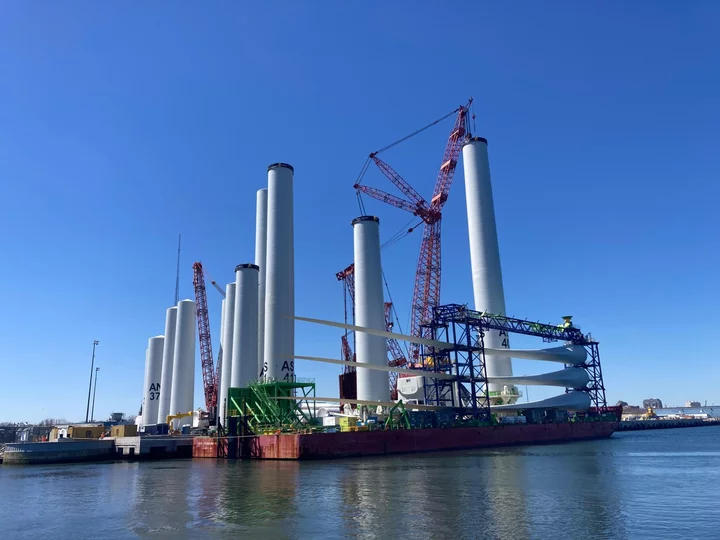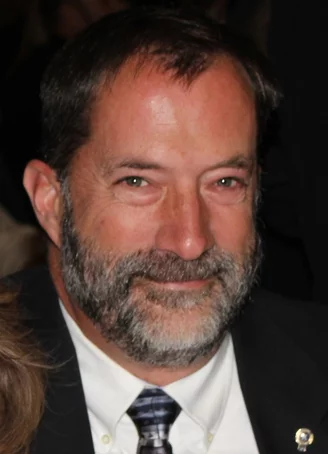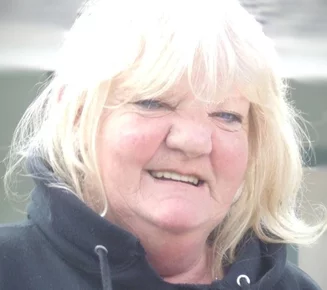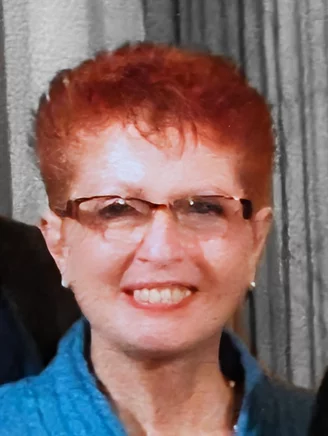New Website From EPIC, CoreHub Set Up to Answer Your Questions About the Offshore Wind Project
LoCO Staff / Monday, July 8, 2024 @ 10:37 a.m. / Economy
Image of offshore wind turbines being assembled in New Bedford, Massachusetts Credit: Tom Wheeler.
Press release from the Environmental Protection Information Center:
Have a question about offshore wind? A new website can help answer your questions with links to primary sources. The website, created with contributions from the Environmental Protection Information Center, Humboldt Waterkeeper, and the Redwood Region Climate and Community Resilience Hub, answers many frequently asked questions about offshore wind and provides an opportunity for you to submit your own questions to be answered.
Researchers at Brown University’s Climate and Development Lab have tracked how the fossil fuel industry and dark money groups have funded the development of organizations hostile to offshore wind and the dissemination of disinformation about offshore wind. Because of this, members of our community may be unknowingly consuming and sharing disinformation designed to harm the offshore wind industry and benefit the fossil fuel industry.
“Offshore wind is an important topic for our community. In working to decide whether this is right for Humboldt County, it is important that we are equipped to have a fact-based conversation,” said Matt Simmons, Climate Attorney at the Environmental Protection Information Center (EPIC).
The purpose of the website is to provide a centralized place to learn more about the details of the proposed offshore wind projects, along with potential benefits, costs, and risks associated with the projects. The website is available at northcoastoffshorewind.org and will be updated regularly as we learn more information about the proposed projects.
BOOKED
Today: 11 felonies, 15 misdemeanors, 0 infractions
JUDGED
Humboldt County Superior Court Calendar: Today
CHP REPORTS
Murray Rd / Mckinleyville Ave (HM office): Traffic Hazard
ELSEWHERE
RHBB: Spyrock Road Closed After Grenade Found in Abandoned Vehicle; Bomb Squad Requested
Fishing the North Coast : Sacramento, Klamath salmon rebound projected for 2026
County of Humboldt Meetings: Behavioral Health Board Executive Committee Meeting - March 4, 2026
Hundreds of Deaths, Thousands of Injuries, Billions of Dollars: The Cost of Extreme Heat in California
Levi Sumagaysay / Monday, July 8, 2024 @ 7:16 a.m. / Sacramento
Death Valley. Photo by RDNE Stock project via Pexels.
A blistering California heat wave over the past week and through the Fourth of July holiday could be topped off by the hottest temperature ever recorded on Earth. That kind of extreme heat has led to more deaths than wildfires and cost billions of dollars over a decade, according to the state insurance department.
Following through on a mandate from 2022, a new report from the department looked at seven extreme heat events in the state from 2013 to 2022 and found they took the lives of several hundred Californians.
The events also had a total economic impact of $7.7 billion in the form of lost wages and productivity, agricultural and manufacturing disruptions, power outages, infrastructure damage and more.
The state’s top 20 deadliest wildfires, dating back to 1933, killed a total of 312 people, according to Cal Fire. The death toll from the extreme heat events identified by the Insurance Department was higher — estimated at nearly 460 in a first-of-its-kind report the department released last week. And it is likely that the toll was actually greater, at nearly 4,000 in a decade, a 2019 Los Angeles Times analysis showed.
Michael Mendez, an assistant professor of environmental planning and policy at UC Irvine and author of “Climate Change from the Streets,” agreed that the toll is most likely higher, because extreme heat’s effects can be hard to designate and quantify.
“It’s really important to understand that heat is a silent killer,” Mendez said. Yet extreme heat “requires the same amount of speed in action that large disasters get, such as wildfires,” he added.
One of the main goals of the report is to provide data that can help inform and lead to action by policymakers, governments, businesses and the insurance industry.
There is little to no insurance coverage available for some effects and costs of extreme heat, such as lost wages for workers, power outages for residents and businesses, and damage to railways, according to the report.
Insurance Commissioner Ricardo Lara and the department are under pressure to tackle the insurance availability and affordability issues that have plagued the state because some insurers have stopped renewing or writing new homeowner policies here, citing wildfire risk as a big factor.
The report also follows years of warnings about extreme heat and other effects of climate change by other state entities, such as the Legislative Analyst’s Office, and lawmakers’ efforts to address them.
The 92-page report, which assesses the insured and uninsured costs of heat and recommends quick action and changes, was mandated by a bill Lara sponsored that was signed into law in 2022, whose main goal was to establish an extreme heat ranking system. That system, CalHeatScore, is being developed now by the state Environmental Protection Agency with help from other state agencies, and is set to roll out next year.
The effects of extreme heat are disproportionately borne by low-income communities, older adults and outdoor workers, the report also found. Black, Native American and Hispanic Californians had the highest rates of deaths, respectively, compared with Asian and white California residents, during the events examined by the report. That’s why the report’s authors — the Insurance Department, with input from the state’s Climate Insurance Working Group, and a consultant it hired to produce the report — call for equity when thinking about extreme heat policies and programs by considering the needs of vulnerable populations, including elderly people living alone, and outdoor and indoor workers.
Besides the hundreds of deaths, the report showed that extreme heat resulted in more than 5,000 hospitalizations, almost 10,600 emergency department visits, more than 138,000 outpatient visits and nearly 344 adverse birth outcomes.

Kathy Baughman McLeod is chief executive of Climate Resilience for All, a global non-governmental organization dedicated to addressing extreme heat for vulnerable communities. She is part of the working group, and said the data from this new report could be used to help with the “normalization of insurance products related to heat.”
“We could use this data to create forecast-based insurance products that pay out when the forecast for the heat wave comes,” she said.
Baughman McLeod would know — she has worked with insurers on creating new insurance products, such as insurance that helps replace women’s income in India when they’re unable to work on extremely hot days because the products they sell might spoil or their work hours are reduced. She also helped create insurance for coral reefs in Mexico.
Meanwhile, the effects of extreme heat on health and life insurance are not known yet. Adrita Bhattacharya-Craven, director of health and demography at global insurance think tank The Geneva Association, said the Insurance Department’s findings align with some of her organization’s findings on health, climate and insurance, especially the disproportionate effects on the elderly and vulnerable populations. She said there is hardly any climate-sensitive data on mortality or morbidity when processing insurance claims, except for deaths from wildfires or possibly extreme heat.
“For example, a medical professional is likely to report a stroke as just a stroke, without specifying that it was induced by prolonged heat exposure,” Bhattacharya-Craven said. “There are no tools to consistently capture such information right now… In the long run, we need to map vulnerability with more granularity.”
Other main recommendations in the report:
- Expand investment in planning for disasters, as well as use existing state and federal funding to prioritize efforts such as strengthening infrastructure against extreme weather, and restoring access to trees and green spaces.
- Encourage strategies to try to reduce heat-related illnesses and injuries for workers across sectors. That includes incentivizing businesses to “meet benchmarks above the minimum indoor and outdoor temperature standards” set by governments.
- Improve tracking costs of planning for extreme heat events.
The report also recommends the planting of more trees, which could help provide shade, help health outcomes, reduce energy needs and more. It also calls for cooling systems for dairy cows — important because California is the largest dairy producer in the nation.
Extreme heat “requires the same amount of speed in action that large disasters get, such as wildfires.”
— Michael Mendez, assistant professor, UC Irvine
A few of the recommendations are already happening in some fashion. The state’s Occupational Safety and Health Standards Board recently approved a rule requiring employers to reduce the risk of extreme heat for warehouse, restaurant and other workers. After a long delay, it’s set to take effect in August. Also last week, the federal OSHA proposed a rule, years in the making, that tells employers how they should protect indoor and outdoor workers from heat when temperatures reach two thresholds: 80 degrees and 90 degrees.
Municipalities such as Los Angeles have programs that help certain residents afford air conditioners, or that break up their utility bills so they’re more manageable, so residents don’t avoid using their air conditioners when needed. Cooling and resilience centers in different parts of the state help people who need relief from the heat.
But Gov. Gavin Newsom last week signed a budget that slashed $107.8 million in funding for programs and projects that address extreme heat, and shifted $55.7 million across different programs. The cuts affect funding and other help for tribal, local and regional entities to establish heat action plans, provide shade, expand green spaces, educate the public about heat and more.
Some of that funding could be restored through a bond measure proposed by lawmakers for the November ballot that would include raising hundreds of millions of dollars for extreme heat programs.
As extreme heat events become more common, Baughman McLeod said the report’s findings are just a first step. She said the systems around addressing extreme heat aren’t adequate, but that the findings from the report should lead policymakers and others to act with urgency.
“We can’t do this quickly enough,” she said, adding that “the world is watching what California does.”
###
CalMatters.org is a nonprofit, nonpartisan media venture explaining California policies and politics.
OBITUARY: John Soule Gladding, 1962-2024
LoCO Staff / Monday, July 8, 2024 @ 7:03 a.m. / Obits
On Wednesday June 19, 2024,
John Soule Gladding died suddenly and unexpectedly at home.
He was born on July 2,1962 in Oakland and moved to Eureka with his family at the age of five. He attended Worthington Elementary, Zane Junior High and graduated from Eureka High in 1980. He attended HSU and earned his BA in Economics in June 1984. John attended Officer Candidate School in Newport, Rhode Island, was commissioned in the Navy in 1985 and served on board the Command Ship USS Coronado until his honorable discharge as Lieutenant, Junior Grade in February 1989. During a 10-month tour based out of Gaeta, Italy, he participated in operations in the Gulf of Sidr and the Persian Gulf. He also sailed to Greece, Yugoslavia, and Bahrain on diplomatic assignments, then was stationed in Pearl Harbor for the remainder of his service. He received several citations and awards for exemplary performance under arduous and dangerous conditions while in the Mediterranean Sea and Persian Gulf.
He was released from active duty and transferred to Naval reserve until 1993, and during that time he continued his education at Humboldt State University to obtain his MBA. He was the executive director for the American Red Cross in Eureka for over 10 years and traveled to Carmel, Bakersfield, Ouray, Colorado and New Orleans, Louisiana to serve as interim executive director.
He met the love of his life, Karen, in 1994 and they married in 2002. They shared a wonderful life together in Eureka — loved to travel, attend music festivals, hike, camp, read and recently enjoyed their 22nd anniversary in Napa. They traveled to many cities in California, visited family in Arizona, Washington State, New Jersey and New York. Their favorite travel destination was Puerto Vallarta, Mexico, where they snorkeled, zip-lined, parasailed, hiked, rode horses on the beach, enjoyed amazing food and the company of good friends.
He retired from the Red Cross in 2004 to manage their rentals full time and continue to travel. John stayed active in the community as a member of Henderson Center Kiwanis, and as a Board Member of Coast Central Credit Union.
He is survived by his wife, companion and travel buddy Karen, brother Mike Gladding (Sydne), nieces Sara Yoshihara (Shuzo), Crystal Leffler (Jed), Molly Gladding, nephews Jeff Gladding (Steph), Steve Gladding (Becca) and numerous grandnieces and nephews. He is preceded in death by his parents Allen and Jean Gladding and beloved dogs Tutt and Bailey. His favorite quote was attributed to Groucho Marx, “Outside of a dog, a book is man’s best friend. Inside a dog, it’s too dark to read.”
John will be greatly missed. He left us before he had a chance to finish his great life adventures. He was a wonderful husband, brother, and uncle and a great friend to many. Many thanks go out to the 911 operator, firefighters, paramedics and sheriffs who responded so quickly to try to help John. Thank you to the donor network for carrying out his wishes to continue to help others through organ donation. A special thanks to Mark at Humboldt Crematorium for helping Karen through many difficult decisions and for taking excellent care of John before sending him on his last journey.
In lieu of flowers, donations can be made to Miranda’s Rescue, Humboldt Spay and Neuter, the American Red Cross or the charity of your choice in his memory. A celebration of life for John will be held sometime in late August and will be announced later, on Karen’s Facebook page.
###
The obituary above was submitted on behalf of John Gladding’s loved ones. The Lost Coast Outpost runs obituaries of Humboldt County residents at no charge. See guidelines here.
OBITUARY: Lillian Ann Brown (Fidler), 1949-2024
LoCO Staff / Monday, July 8, 2024 @ 7 a.m. / Obits
It
is with the deepest depths of sorrow that we announce the death of
our mother, Lillian Ann Brown (Fidler). Our beloved mother passed
away June 30, 2024 at St Joseph Hospital in Eureka. Lillian was born
to Irma Elaine Miller and Stuart Miles Steele, on August 1, 1949 in
San Francisco. They moved around and eventually settled and she grew
up in Humboldt County.
Mom was truly a beautiful soul whose loss will impact us all a lifetime. Mom was a little rowdy in her younger years, heck her whole life really. She was funny, quick witted, and a true gem in all our collection. She reminded me of the song watch out boy, she’ll chew you up!
Mom’s greatest love was her family, friends and friends who became family. Mom’s full time job was praying and being a mom, grandma, great-grandma, aunt, cousin and friend. She gave her life and time to us selflessly. She made her rounds to all our houses to just visit or to help out. I’m quite sure mom has attended more births than anyone. She loved all the babies to heaven and back.
In her spare time she loved collecting coins (taking all your change to look through it), rock hunting, yard selling, gambling, gardening, scratching lotto, free piles (or get hit if you didn’t stop), watching bones, Castle, NCIS (until they took Ziva off) Long Island, Medium and most recently Chicago Fire and PD and Grey’s Anatomy.
Lillian is survived by her sisters Gene Thomas and Martha Wolf; her daughters Mary Brown-Chapman, Lamoyne Brown, Julie Mccain, Amanda Morrison (Rick Morrison), Amber Sanchez (Donald LeVaugh), Heather Fleming (Tony Lewis) and Rachel Fleming; her sons Richard Brown (Dawn Petty) Stuart Sanchez, Dennis Fleming (Natalie O’kelley) and Brady Fleming (Emerley Fleming); her grandchildren Ryan Lee Chapman, Maynard Chapman, Robyn Sherman, Crystal Sanchez, Ronald Sanchez (Maria Rodriguez), Walter Sanchez (Mallory Legace), Silverio Sanchez, Gregory Shelton, Mark Shelton, Morgan Shelton, Terri Sanchez, Silverio Sanchez, Brittany Sanchez ,Raymond Sanchez, Jimmy Warden, Heather Morrison, Duke Morrison, Michael Morrison, Allen Preslar III, Kayleigh Preslar (Travis Woods), DJ LeVaugh, Jacey LeVaugh, Steven Corbera, Troy Fleming, Lillian Lewis, Anthony Lewis, Scotty Snead Jr, Linda Snead, Rachel Snead, Lindsey Fleming, Garrett Brashear, Damien Brown, Richie Brown, Colton Sanchez-Scripter, Sharmel Palmer, Raelynn Fleming, Dennis Fleming III, Mylah Fleming, Amya Fleming, Elizabeth Andersen, Emerson Fleming, Elliott Fleming, Irma Fleming; her great-grandchildren Julius Chapman, Khaliyah Sherman, Khloe Graham, Lu Graham, Kayden Fidler, Diego Sanchez, Maya Sanchez, Hunter Redhat, River Redhat, Damen Carlson, Breana Sanchez Raeana Sanchez, Carl Sanchez, Destiny Sanchez, Justen Tritchler, Sophia Shelton, Kenny Nevers, Silverio Sanchez Jr, Clarence Sanchez, Eriana Sanchez, John Steele, Isabella Renfer, Jordan Renfer Jr, Bow Renfer, KIng Sanchez, Ember Sanchez, Enzley Helmer, Ryan Helmer Jr, Jeffrey Helmer, Avery Morrison, Haylie Asher, Joanne Morrison, Sophia Morrison, Jonathan Glass, Kayley Glass, Maddison Morrsion; and many cousins, nieces, nephews and friends.
She was preceded into death by her loving mother Irma Steele; her father Stuart Steele; her brothers John Fidler, Butch Hixon and David Lawson; her grandsons Lewis Sanchez and Brady Fleming Jr, and so much more family and friends.
Her funeral is July 10 at 1:30 p.m. at Goble’s Mortuary — 560 12th St. Fortuna.
Everyone is welcome to join us at her service. If you’d like to send flowers to Goble’s or bring the day of the funeral.
###
The obituary above was submitted on behalf of Lilian Brown’s loved ones. The Lost Coast Outpost runs obituaries of Humboldt County residents at no charge. See guidelines here.
OBITUARY: Melody Rae ‘Mel’ Mackill-Luzzi, 1951-2024
LoCO Staff / Monday, July 8, 2024 @ 6:49 a.m. / Obits
Melody
Rae “Mel” Mackill-Luzzi passed on Thursday, May 30, 2024. She was
born to Robert Bruce and Grace Luton in Humboldt County in 1951.
She battled leukemia for more than a decade and was a fierce supporter of her friends and family. Her family BBQs were a well-loved highlight for the Fourth of July, and her warm voice greeting you on a phone call lightened every day.
Mel raised her two sons, Michael Mackill and Gordon Mackill (April) between Humboldt county and Kamloops, B.C, Canada. Mel’s older son, Michael, introduced Mel to her husband, Ray Luzzi, in Eureka. Their love story includes 25 years together, many trips to Reno for the Hot August Nights car show and festival, owning and operating their unique boutique store (The Blue Goose), and spans across Humboldt and Mendocino counties.
Gordon has remarked many times that he has never seen his mother’s natural hair color — she was known for a custom fiery shade of red that matched her passion for living with love and purpose.
She and her sisters Harmony (children Chris and Misty), Holly (daughters Randi Jo and Rebecca), and Tami (daughters Lyndsey and Lacie) were raised in the redwoods. Mel was an active and excited member of her home community as both a hairdresser and at her checkout line at the local Safeway market.
Mel was preceded in death by her parents (Robert Bruce Luton and Grace E. Luton) and her sons’ father (Frank C. Mackill).
Mel’s family and close friends will be celebrating her life privately. In lieu of flowers or gifts, the family asks you to consider a donation to St. Jude’s Children’s Research Hospital in her memory.
###
The obituary above was submitted on behalf of Mel Mackill-Luzzi’s loved ones. The Lost Coast Outpost runs obituaries of Humboldt County residents at no charge. See guidelines here.
PASTOR BETHANY: A Sinister Impulse is Taking Over Our Churches
Bethany Cseh / Sunday, July 7, 2024 @ 7:05 a.m. / Faith-y
Dear
Christian friends,
While I am deeply grateful for your friendship and our sibling-hood, I feel I must warn you about what I see in our country regarding Christian Nationalism. There is a sinister influence taking place in our churches and this country and it’s affected us Christians the most. Like black mold slowly growing in the forgotten corner of your damp rental, we didn’t notice until it seemed too late. We felt it — the wheeze, the itchy skin, the headache, the red eyes and stuffy nose and lethargy. We chalked it up to the crud or allergies, all the while the mold spread behind bed frames, dressers and end tables. It sunk into the walls, infecting the drywall. But one day after your landlord came to visit, the mold disappeared. Behind a fresh coat of paint, it seemed locked away and you could get back to life. Some of your symptoms even dissipated. Every month or so your landlord showed back up and threw another coat on your walls but no matter how much paint covered the mold, it was still there growing stronger.
The quest for power and control has long dominated our Churches, blaspheming the name of Jesus. This sinister force has seduced many pastors and Church leaders for generations, whispering convincing words like, “Take and eat. You’ve earned it. You deserve it. No one will know. You’re in charge. You’re God’s best.” The Church is the vulnerable gathered, the wounded held, the forgotten included, the poor, lonely, hungry, desperate brought in to belong and be reminded they are loved. But when pastors and leaders are seduced by power and control, the Church becomes a den of robbers and a safe-house for thieves, stealing Jesus from the most vulnerable. And no matter how many coats of paint are used to hide and cover up this insidious evil, it’s been leaking out and collaborating with other forms of power and control.
The term “Christian” was first a negative slur, like it was embarrassing to be known as “Little Christs,” but those first followers of the Way of Jesus weren’t intimidated by the insults. They wore it as a badge of honor as they continued meeting together, sharing their property, food and resources with each other, while they blessed and loved their neighbors, forgave their enemies, lived a non-violent life, walked with humility while learning from their mistakes (while my glasses are sometimes rosy, I know there were severe disagreements and quests for power then, too). The way of Jesus is at the bottom of society where power and control suffocates. The way of Jesus is working for justice and loving mercy, and walking humbly with God. It’s bravely telling the hard truth of our desire for power and control and declaring we don’t want to live like that anymore and to admit we need help. The way of Jesus is gratitude, joy, peace and love.
Instead what I’m seeing are “Christian” leaders coming alongside power and control, parroting the whispered tempting words they’ve been discipled in from a voice saying, “I will give you all their authority and splendor; it has been given to me, and I can give it to anyone I want to. If you worship me, it will all be yours.” (Luke 4:6-7) Basically, “I, as a powerful and influential Church leader, will give you all my followers and members if you help move our country into forced Biblical ways.”
I’m not sure if there was a cart or horse, and I’m no historian, but this marriage between politics and religion is more insidious and powerful than I thought was possible. Christian nationalism is a movement of evil that many people have been seduced by and it’s the most vulnerable in our society that will be negatively affected by it. (Google Project 2025). You might feel safe because you have the privilege of moving out of the mold-infested house. But much of the country is not people of privilege, and painting over the poison while saying this is what’s best for you will eventually kill our country. I am convinced that unless our religion is moving this country into greater ways of love for the least, humble empathy in our interactions, and love for our enemies, we are walking away from Jesus and towards satan.
Christian friends, may we bravely look closely and honestly at the ways we’ve been seduced and used by power. May we hold our leaders accountable without fear of repercussion. And may we fall on our knees in repentance and start over in Love.
With Christ’s sacrificial love,
Pastor Bethany Nass Cseh
###
Bethany Cseh is a pastor at Arcata United Methodist Church and Catalyst Church.
GROWING OLD UNGRACEFULLY: Yo Mama’s a Fish!
Barry Evans / Sunday, July 7, 2024 @ 7 a.m. / Growing Old Ungracefully
In his book, now nearly 30 years old, Darwin’s Dangerous Idea, the philosopher Daniel Dennett (who died last April) claimed that evolution by natural selection deserves the prize for “the single best idea anyone has ever had.” It’s a formidable declaration, but I’ve never heard a worthy counter-claim.
Just to remind anyone who might be a tad rusty on their high school biology classes, what we’re talking about here — evolution — is the result of random genetic mutations in the process of passing the genome (the genetic information carried in the egg or sperm) from one generation to the next. Some small fraction of these mutations are beneficial in that the members of a species that possess them are better adapted to the environment in which they’re born than their sibs. This gives them the edge in terms of survival and — more importantly — reproduction, over those that didn’t get that mutation. So a useful mutation gets passed along.
We humans, together with earthworms and E.coli and redwoods and fungi — all living creatures — came from the same grand (times a billion or so) parent. Every member of every species (two million classified ones, plus uncountable others) alive today is the end point of an unbroken chain of successful ancestors going back nearly four billion years, where “success” means they reproduced. These bodies of ours? We’re just the vehicles that genes employ in their quest for immortality.
For me, what makes this spectacular process so hard to appreciate are the change-points. At what point did my great (x 100 million) grandmother, who looked like an early fish, turn into an amphibian; thence into a shrew-like mammal; and when did that creature morph into an ape; which then, at some point, evolved into someone like Lucy (3 million-year-old Australopithecus); who became — at what point? — human. Someone who, suitably attired, would look like any one of us strolling down Second Street on a Sunday morning.
Trick questions. There were no “points.” Pick, at random, any member of this long, unbroken chain of creatures. Now check out their parents and their immediate offspring. Notice something? They all look about the same. Evolution is gradual, meaning it’s imperceptible from one generation to the next. (A possible exception: Diligent observers of birds on the Galapagos Islands believe they have actually seen evolution in action as a result of rapid changes in their environment.)
The evolutionist Richard Dawkins has a thought experiment on these lines, outlined in his recent book The Magic of Reality (written “for young people” — my kind of book!). He asks me, the reader, to imagine a photograph of one of my parents, say my mother. On that photo, I place a photo of my mother’s mother. On top of that, a photo of her mother…and on and on, a mountain of photos, each photo sitting between a mother and a daughter. All the way back to nearly 400 million years ago. (Allowing an average of four years between generations, that’s 100 million photos, a pile as high as three Mount Everest’s stacked on top of one another.) The last photo in your series is, as I said, a fish, given the name Tiktaalik.
Tiktaalik roseae, a “missing link” fossil between sarcopterygians (bony fish with lobed paired fins) and tetrapods. Zina Deretsky, National Science Foundation. Public domain.
That’s my, and your, long ago ancestor, from about 375 million years ago. Tiktaalik was a fish which, over time, evolved wrists and ankles enabling it to use its fins as feet, crawling up from the water to dry land. Tiktaalik (or its close cousin) is the ancestor, not just of humans, but of all non-fish vertebrates.
But — this is the take-home message — there never was a point at which you could say, this generation is fish and this next generation, amphibian: the changes from one generation to the next were too subtle. Similarly, from ape to human, an ape never gave birth to a human. It was all very (very!) gradual. But that’s all it took, thanks to the magic of evolution.
Millions of tiny changes over aeons of time gets you from Tiktaalik to you and me.






